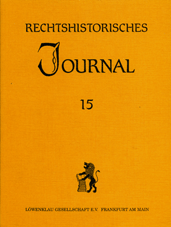

Keywords: Christoph Graupner; Baroque; Passio; Cantata
Christoph Graupner (1683-1760) was a High Baroque composer who worked primarily in Darmstadt, Germany. He was a student of both Johann Schelle (1648-1701) and Johann Kuhnau (1660-1722) while studying at the University of Leipzig from 1696 to 1707. For the duration of these formative years, Graupner developed a compositional style influenced by the Italian and French masters of the time. At the time of his 1712 Kapellmeister appointment at the court of Darmstadt, Grauper was an established composer and keyboardist. His reputation as an important composer of the time is evident in his appointment as Kapellmeister in 1724 at the Thomaskirche, Leipzig; Graupner, however, opted to remain at Darmstadt when the Darmstadt court increased his salary. During his tenure at Darmstadt, Graupner composed over 1400 cantatas and many instrumental works. One cantata representative of this period is GWV 1127/19 O Welt siehhierdein Leben used as the starting point of placing Graupner’s works in the context of the compositional techniques of the eighteenth century. A detailed textual and musical analysis is presented, together with major compositional influences and performance considerations of the Baroque period.
More...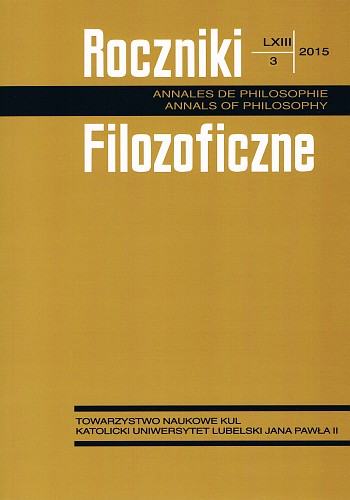
Keywords: love;sex;moralization;teleology;
In this essay I explore Alexander Pruss’ conceptions of love and sexual desire. I argue that he fails to provide a convincing account of either and that one reason for this is that he ignores far too much relevant material in philosophy and the arts that needs to be taken into account in a thorough investigation of such matters. I argue further that Pruss’ understanding of love and sex is highly moralized, meaning that his discussion is not at all sensitive to the actual human experience of these, but consistently falsifies them. I also argue that the teleology to which Pruss appeals in order to ground his claim that, in the sexual act, the bodies of the lovers are striving for reproduction, is implausible and, further, that, even were it not, we could not infer from such teleology the moral conclusions that Pruss wishes to extract from it.
More...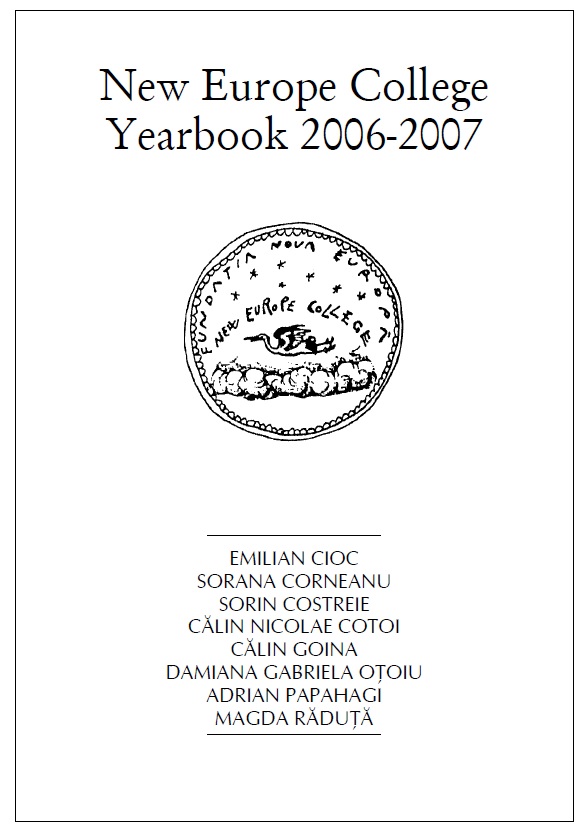
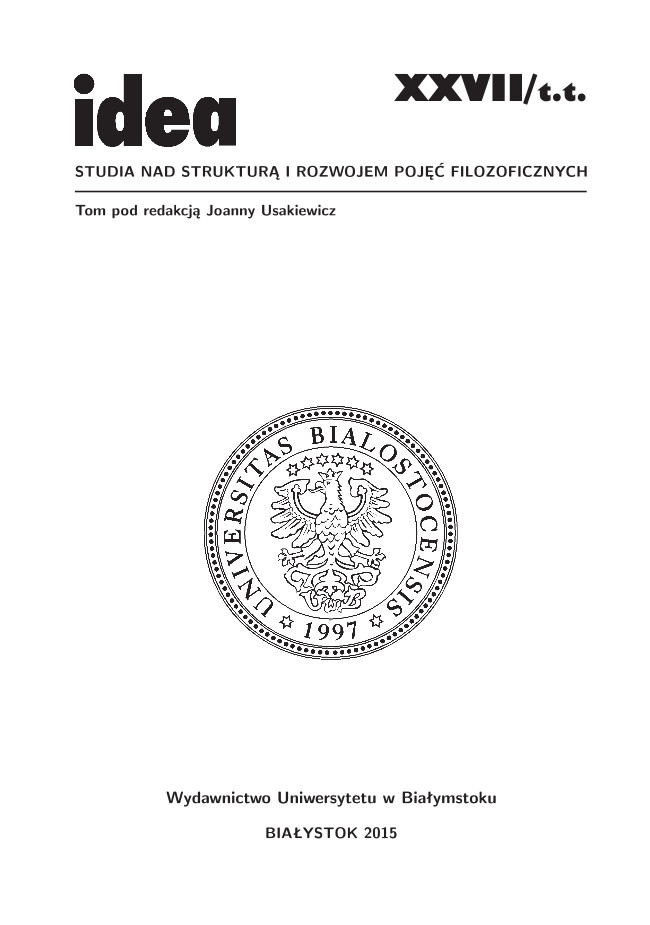
Keywords: Leibniz; Locke; personal identity; real and moral identity; apperception
The main aim of this paper is to reconstruct G. W. Leibniz’s view on nature and structure of human identity. For this purpose selected writings of the author and of several other philosophers whose impact on his conclusion was the most noticeable are exploited. Analysis of these sources in relation to Leibniz’s whole monadological system provides us with the explication of human identity in his anthropology. In the first part the author concentrates on the historical background of a reflection on the notion of nature, which in Leibniz’s philosophy constitutes the basis of human identity. The Hanoverian philosopher, as the author claims, continues Aristotle’s thought on this issue. Afterwards a basic individual being – monad – is presented. Through the monad the German philosopher managed to unite two – seemingly opposing – perspectives: substancial (aristotelism) with “consciously-reflective”, which is synonymous with Descartes’ cogito. In the second part the author introduces the concept of the human person, which indicates such features as rationality, substantiality and individuality. From the latter flows such characteristics of personhood as uniqueness, distinctiveness and incommunicability. Even though this classical interpretation of the person was deconstructed by Descartes, the author shows that the monadic subject did not lose the attributes Leibniz’s processors wrote about. In the third part the author presents John Locke’s interpretation of the human identity described in his opus magnum – An essay concerning human understanding, in opposition to which Leibniz developed his own theory. In the fourth part the structure of human identity in the interpretation of the German is presented. The author of this paper particularly focuses on the characteristics of its two dimensions: real identity and moral identity. At the end, in the fifth part, the epistemological foundation of Leibniz’s anthropology: perception, apperception and reflection, its specifics and the relation to two levels of human identity presented in Nouveaux essais sur l’entendement humain are explored.
More...Keywords: the knowledge – creating firm; dynamic capabilities; organizational flexibility; cognitive flexibility; innovation
The main topic of the paper is identification of the psychological mechanisms which explain dynamic capabilities of the firm. In the paper, conceptualization of the construct of dynamic capabilities as a central concept of the firms which create knowledge, is analyzed and discussed. The purpose of analysis was: (1) to identify the critical contributions of the traditional aproaches to new concepts of the knowledge-based organizations and knowledge-creating firm, (2) to identify the psychological mechanisms of the dynamic capabilities of the organizations, (3) to identify deeper psychological structure which supports dynamic capabilities of the firm. By theoretical and empirical argumentation in the paper, hypothesis that organizational strategic and cognitive flexibility represent basic psychological mechanisms which connect individual and organizational knowledge, routine and inovations are elaborated. Some practical implications of the results of the presented analysis are discussed.
More...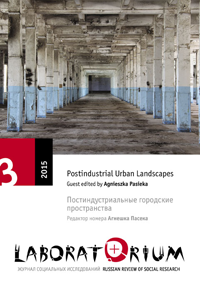
Keywords: Community; Small Town; Social Cohesion; Gift Exchange; Local Identity;
Community studies in social sciences tend to treat community as a given object with structural characteristics to be revealed. This approach is particularly adopted by researchers of local communities, including small towns. However, it is questionable whether all spatially localized social aggregates can be rightfully called communities.This paper argues that even though this approach has a long tradition in social sciences, it cannot deal adequately with the key issue of integration and disintegration of communities. The authors rely on classical sociological theory to suggest a strategy of analysis that pays attention to the dynamics of social cohesion and considers communities from the standpoint of unification processes. Building on empirical data gathered during ourstudies of Russian small towns, the authors indicate several mechanisms of consolidation that support the cohesion of communities.
More...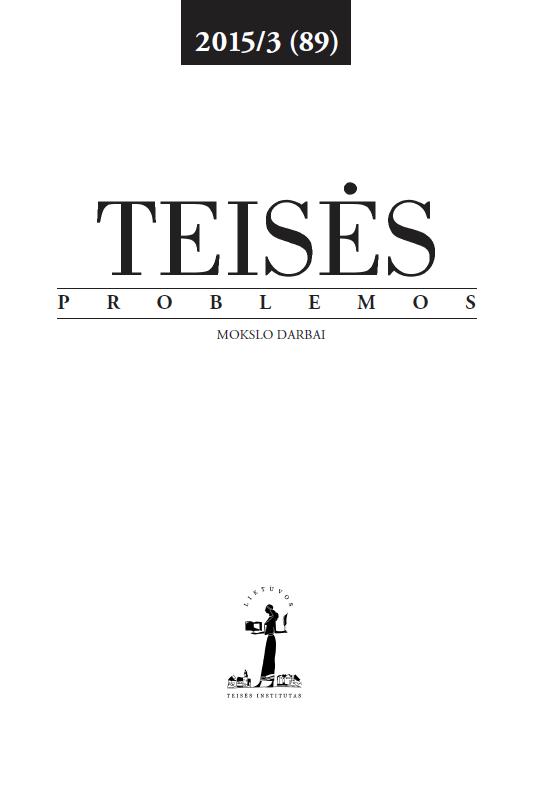
The article deals with the issue of Lithuanian case-law on the matter of spelling in personal documents with letters from non Lithuanian alphabets or disregarding rules of Lithuanian language grammar. Question of spelling foreign names in documents is of big political im-portance, since it has received a lot of public attention, in last few decades there were over 20 unsuccessful attempts to pass laws which lay down relevant regulation. Particular focus of research is drawn upon Lithuanian case-law, where recently a judi¬cial precedent occurred, which conflicts with earlier rulings. In a few cases the Lithuanian Supreme Court ruled for Lithuanian-only spelling in documents, but in 2015 a court of first instance (Vilnius county court) delivered a contrary ruling. It did not receive any appeals, therefore, came into force. Such status causes ambiguity when deciding, whether spelling of names in documents not in Lithuanian is prohibited by law. The main objective of the article is to present relevant reasons for this question as far as it concerns the doctrine of judicial precedent. Accordingly, relevant statutory law and legal doctrine are evaluated. This led to finding that, following the conventional view, earlier case-law provides legal principles which should be currently applied. On the other hand, legal principle from the recent precedent could be binding if there was an adequate basis to overrule previous precedents. In the instant case such basis can be found in the fact that the legislature unjustifiably delayed the enactment of relevant rules and this caused a legal gap. Such unjustifiable delay may give courts the power to fill the legal gap by way of interpretation. However, presence of these conditions for overruling are arguable and the most appropri¬ate solution in this case is for the legislature to pass the law, which lays down the rules for the issue in question. Demand for such law is increased by the fact that current legal circumstances create uncertainty and may cause infringements of the right to equal treatment by the law.
More...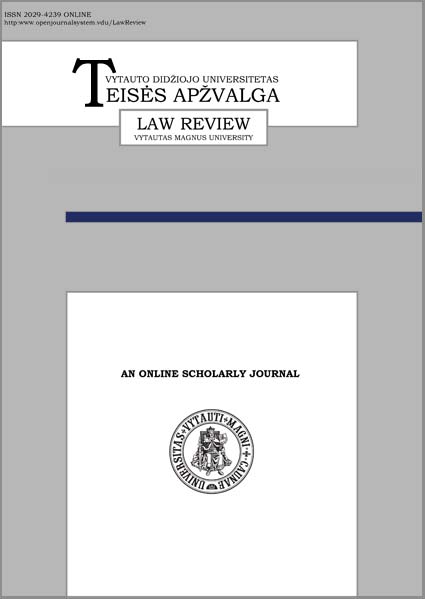
Keywords: Late impeachment; Resignation; Impeachment procedure; State official; Breach of oath
Impeachment is a special procedure, during which state officials can be removed from their positions. It originated in XIVth century, England, in order to strengthen system of checks and balances. It was a tool to create more responsible government. At the beginning the institute of impeachment was very broad: it could be applied to any person (not only state officials), had no concrete procedure and the impeached person could be given various penalties, ranging from fine to capital punishment. Eventually the scope of impeachment was narrowed and it evolved into political tool. England‘s colonies inherited this institute, but it was modified: scope of penalties and subjects were narrowed. Meanwhile late impeachment was part of the regular impeachment from the day it originated, when institute of impeachment was quite broad. Eventually it vanished, but even nowadays is one of the talking points while discussing responsibility of state officials. Late impeachment is defined as impeachment and possible disqualification of former officers based upon their conduct while in office. Late impeachment was not implemented in Federal Constitution of US, though it was not prohibited either. Discussions about late impeachment were renewed after impeachment of Richard Nixon, who resigned during impeachment procedures and avoided disqualification. Most legal scholars tend to support late impeachment because of these reasons: 1) late impeachment prevents situations, when official, who resigns or his term in office comes to an end during the procedure of impeachment, can be elected into that same position again – he avoids disqualification; 2) late impeachment prevents officials from getting social benefits, which can be enjoyed by other former officials; 3) late impeachment allows to increase sense of responsibility among state officials. But some legal scholars say, that in cases, where officials commit a crime, it is not worthwhile of parliament‘s efforts, because such case will still end up in regular court. Impeachment in Lithuania has the same purpose as in England or USA – to increase responsibility culture among state officials. Lithuanian laws don‘t allow late impeachment. However, prohibition of late impeachment is not entirely compatible with Constitution of the Republic of Lithuania for the following reasons: 1) state official may use such loophole to avoid constitutional responsibility; 2) state official can again occupy position, which he was removed from; 3) oath may be breached once in a lifetime, according to official constitutional doctrine, but such person could breach it again; 4) it reduces responsibility and public control of state officials; 5) it can violate principle of equality; 6) state officials, who resigned or their term in office came to an end, maintains social benefits.
More...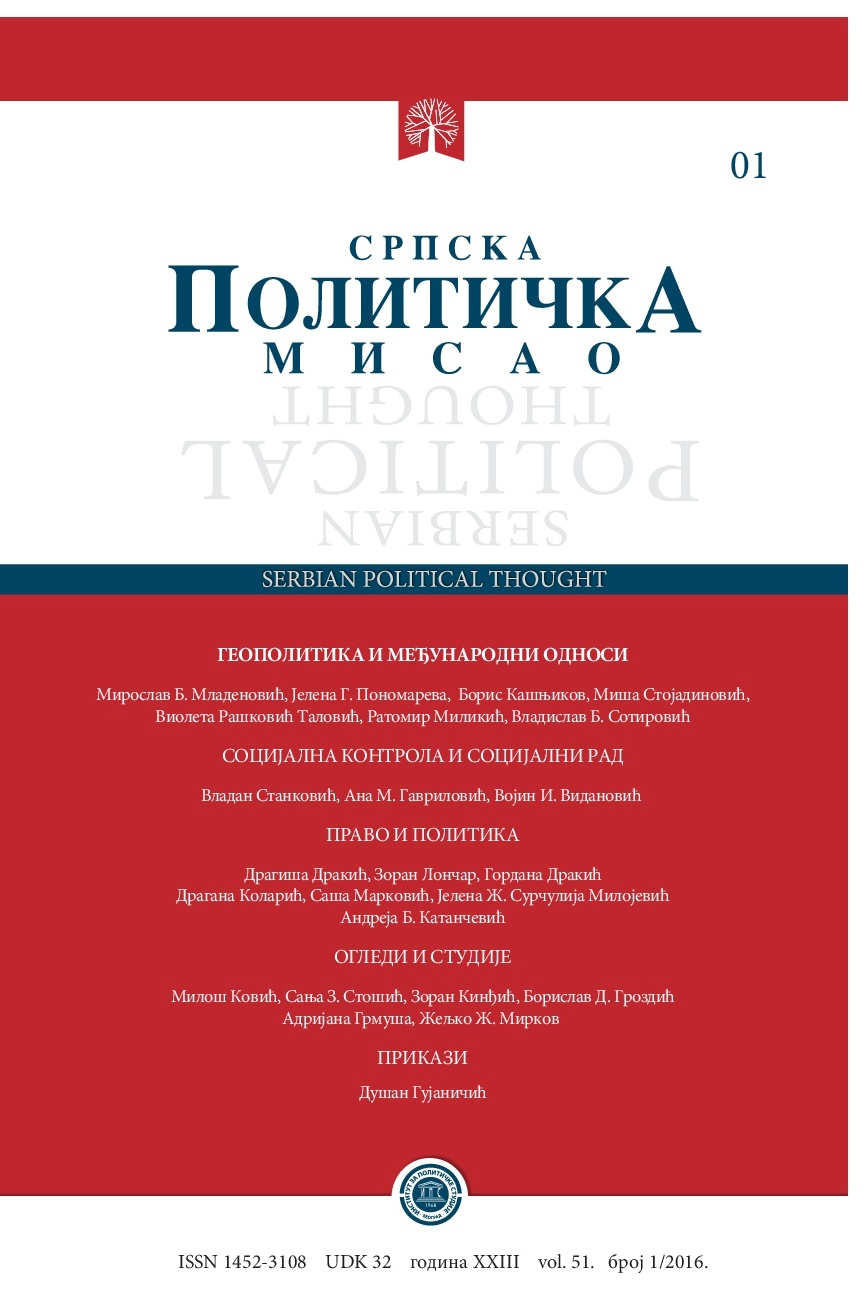
Keywords: Institutionalization; social control; social behavior; standards; management; functionalism;
In Serbia matter of social control is insufficiently researched social area. Much more attention is paid to the utilitarian control and penology ‒ politicological matter governance of others; punishment individual in working process, and disciplining them, and measures mechanical and forced socialization (which covers a range of physical punishment to psychiatric treatment). The profit logic of capitalism requires only a functional approach to social control. In practice, in terms of the institutionalization of social control, little has been done so far. Lack institutional forms of action in this matter seems that instead the institutions of government controls, controls govern institutions. All this only: increases the inefficiency of working exertion, reduces the positive effects of the work, reduces the quality of services and the volume of newly created value, growth and development...
More...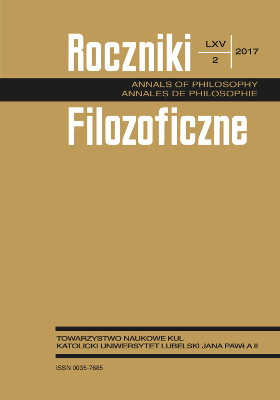
Keywords: Leibniz; personal identity; person; substance; sameness; self-consciousness; memory
Leibniz’s theory of personal identity has been the object of numerous discussions and various interpretations. In the paper I contrast my view on Leibniz’s solution to the problem of personal identity with the view of Margaret Wilson and Samuel Scheffler. They both claimed that Leibniz failed to formulate a coherent, uniform and tenable theory of personal identity. His stance – as they state – contains so many inconsistencies that it cannot be adopted as a satisfactory solution to this problem. I disagree with this opinion. It is my conviction that a more inquisitive analysis of Leibniz’s texts leads to the conclusion that such severe criticism of the results of Leibniz’s studies of personal identity is ill-founded. My paper consists of two parts. In the first part—drawing on suggestions made by Vailati, Thiel, Noonan, and Bobro—I attempt to present the essential arguments against the interpretation offered by M. Wilson and S. Scheffler. In the second part I address two issues. First, I try to discuss the reasons which Leibniz listed to support his thesis that personal identity requires both the continuity of substance and the continuity of some psychological phenomena. Then, I turn to identifying Leibniz’s arguments which support the thesis that what ultimately provides a person with identity is their substantial principle, i.e. the soul or “I.”
More...
Keywords: Leibniz; the best of all possible worlds; the contamination of the world; salvation
Leibniz’s claim that we live is the best of all possible worlds is in contradiction with our experience, which is why we tend to maintain that the world would become better if at least some of its properties and characteristics were different. Leibniz criticized such an approach and argued that every attempt at changing the world would make it worse, or even impossible. His claim seems to be in contradiction with the Christian belief that our world is contaminated with sin, but it will be renewed in the end to become the reality of salvation, i.e. the best of all possible realities. This article puts forward two arguments: (1) Leibniz’s claim is not in contradiction with the Christian belief in salvation; (2) Leibniz’s claim is in contradiction with the human experience of the world because it is a result of an intellectual speculation based on the false assumption that the structure of the human mind adequately corresponds to the mind of God.
More...
Keywords: sociology of education; latent growth curve; longitudinal bifactor model; relationships with classroom peers; a feeling of social integration; sociometric network; developmental changes
The article discusses the specific character of changes in the assessment of the sense of social integration in the classroom between primary school third- and sixth-graders, and their social, demographic and cognitive determinants, with special consideration given to a pupil’s position in the sociometric network. The analysis of latent growth curves – based on a scalar longitudinal measurement invariance, the bifactor model of the Perceived Peer Integration Questionnaire (PPI) and three rounds of the nationwide study School determinants of educational effectiveness (N = 4349) – indicates that the second stage of learning in primary school is characterised by a more negative perception of peer integration in classroom settings, which cannot be explained by socio-demographic variables nor the relationships taking place within peer networks. This indicates that it may be linked to developmental changes rather than to the actual deterioration of peer relations.
More...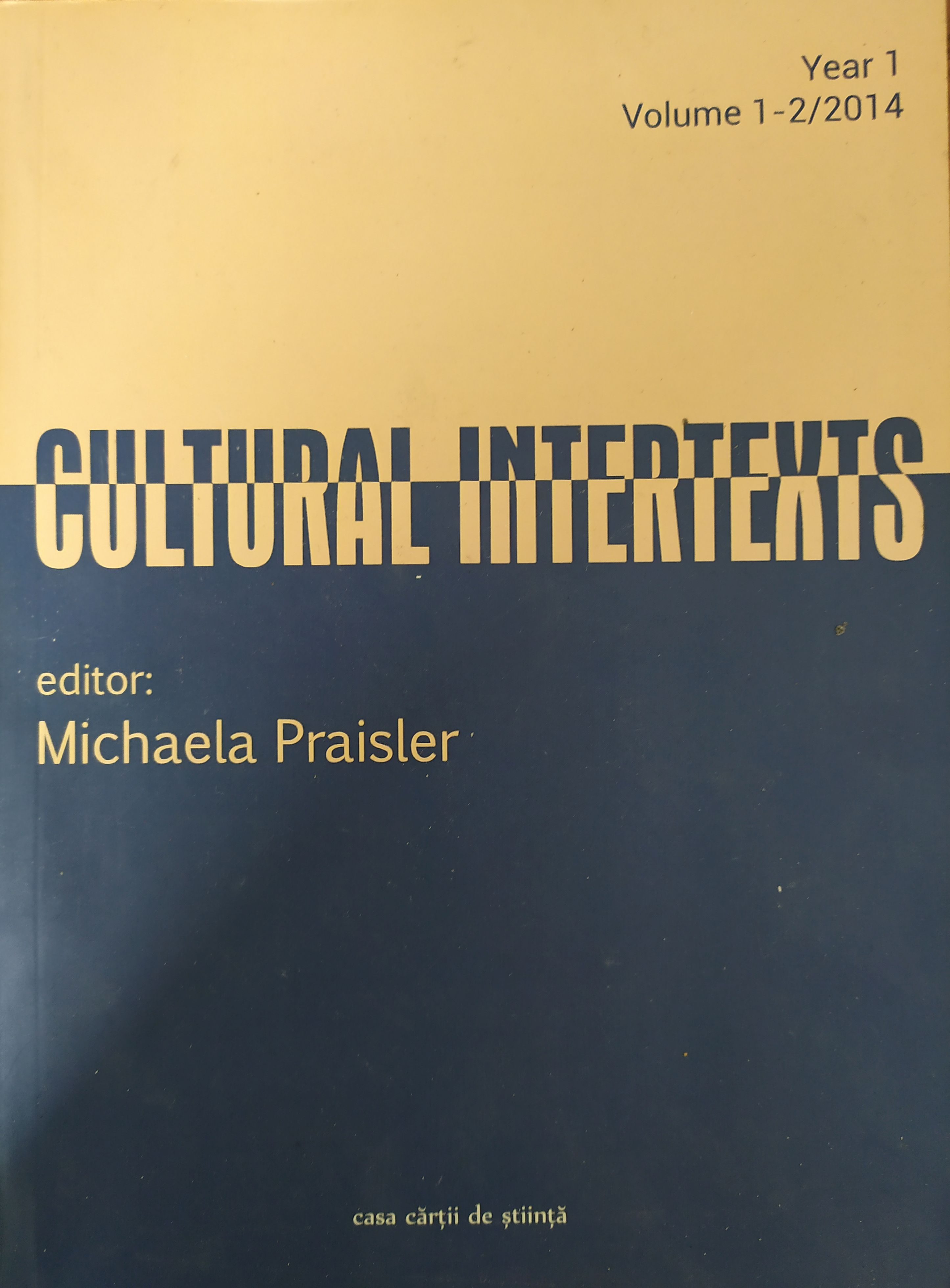
Keywords: intertext; autofiction; feminine writing; erotic literature; discourse;
Approaching a topic yet unexplored in Romanian literature – a lesbian relationship – the novel Legături bolnăvicioase/ Love Sick opens the path for an interest stirring analysis on its thematic and narrative construction, but obstructed, nonetheless, by prejudice and prudishness. The love story between the narrator and Alex (her girlfriend) is, ultimately, a pretext for a piece of écriture féminine, typified by language and imaginative specificities. While following a feminine, autofictional pattern, the novel enters an intertextual dialogue with a series of texts belonging to the (male) canon of erotic literature. If the title alludes to a novel of “sentimental education”, reminding of de Laclos’s masterpiece, Les Liaisons dangereuses ou lettres recueillies dans une société et publiées pour l’instruction de quelques autres, the novelesque discourse displays the intertextual game in an autofictional key, occasionally subverting male patterns. Along these lines, the present paper aims at analysing the functioning of intertextual mechanisms as means of subverting the male discourse, but also the manner in which the feminine discourse challenges canonical conventions and traditional reception.
More...Keywords: Leibniz; Mind; Solipsism; Perspective; Perception; Holism
One of the symbolic images to which Leibniz constantly entrusted the synthesis of his philosophy regards the idea of considering one and the same city from various visual perspectives. Such an image is diffused throughout all Leibniz’s writings and clearly reflects the philosopher’s interest for matters regarding perspective as well as optical phenomena. The point of view of its inhabitants can therefore be compared to a mirror that reflects some different portions of reality. But what do the city-viewers really see? Do they all see exactly the same thing? And assuming the plurality of points of view, how one can be sure that they share the same representative content? The paper presented here tries to offer a plausible interpretation of this topic also by linking different and somehow remote Leibnizian doctrines together.
More...
Keywords: Martin Luther; Protestant hymnal in Bavaria; Reformation; Protestant liturgy; Songbooks; Johann Walter; Bohemian Brethren; Order of the service; Development of the Protestant hymnals.
At the start of the work „The Reformation and its Impact on the Liturgy of the Protestant Church in Bavaria“it is briefly explained what great significance music had in the entire process of the Reformation, in which the three great reformers, Luther, Calvin and Zwingli, and their opinions of music will be depicted. Also described in particular will be the life and works of Martin Luther, who with his various hymnals played a fundamental role in the history of the Reformation. Luther saw music as a gift of God, and thus placed the Word of God on the same level with Music. Still today many of his alterations are found in the Bavarian liturgy, which comprises the fixed parts of the Ordinary with the Proprium, which changes with the liturgical year. After the four orders of the Bavarian Protestant liturgy were compared, suggestions have been made in addition about how the individual parts of the liturgy in the service can be musically implemented.
More...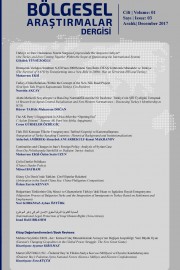
Keywords: China; Sudan; Darfur; Humanitarian Crisis; Genocide;
China maintained a controversial attitude towards the humanitarian crisis in Darfur, which erupted in the western region of Sudan in the early 2000s and caused the death of nearly 300,000 people. It was claimed that the Government of Sudan carried out genocide in Darfur, and China became a party to this genocide by supporting the Government of Sudan in political, military and commercial terms. In the face of those allegations, China underlined the principles of respect for sovereignty and non-intervention in other states’ internal affairs. Darfur has been a milestone for China both to epitomise its approach to international crises and to demonstrate its difference from the Western actors. Hence, this paper aims to analyse what sort of policy China.
More...Keywords: stress; coping; adolescents;
The study was aimed to address three research questions: (1) what are most common stressful events and how adolescents subjectively rate their severeness, (2) how adolescents cope with stress events, and (3) are there any differences in coping in relation to the intensity of stress events experienced by adolescents. The study was conducted on the sample of 1504 adolescents from Vojvodina, age from 15 to 21. Participants were asked to fill out a general demographic profile questionnaire, Stressful experience scale, and A-COPE coping inventory. The results indicated a set of most stressful events experienced by adolescents. Seeking support from friends and avoidant behaviour were the most frequent coping mechanisms reported by participants. It was also established that among adolescents with higher level of stress, emotion focused strategies were used more often than among adolescents that were exposed to less stressful events. The results were discussed within the framework of existing theories and previous empirical findings.
More...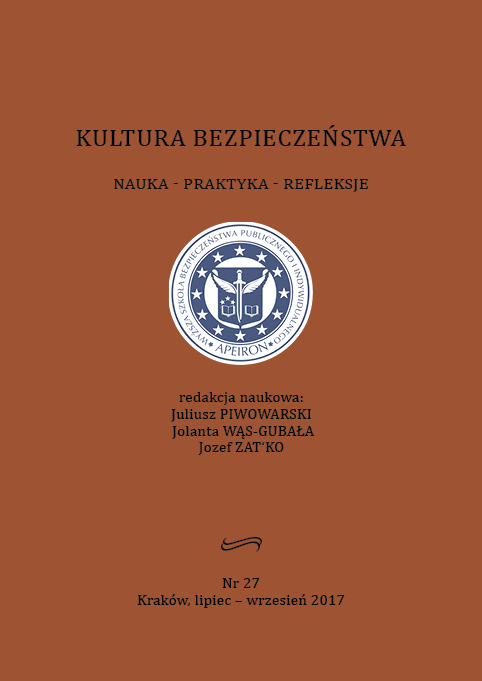
Keywords: fighting skills; self-defense; real fight; effectiveness;
The theoretical perspective is taken here from the General Theory of Fighting Arts and a conception of the culture of security culture. The aim of this study is to describe and attempt to explain the substance and the manifestations of the self-defense phenomenon today in Western countries. Material and methods. Three complementary qualitative research methods were used: a long-term participant observation, content literature analysis, and the method of competent judges/expert courts. It was considered together broad thematic discourse of sources and studies. There was only one question to the experts of self-defense: What is a meaning of self-defense, its substance and manifestations in Western countries today? There were answers from 7 experts from Europe, holders of rank 8‒10 dan in goshinjutsu (art of self-defense), and other martial arts. Direct speeches were included, as well as analysis of sources (books, videos, organizational documents), and scientific studies were used. Results. The results are presented in four parts, corresponding to the areas of occurrence of experts’ general opinions, group fights, role of fencing, and discussion. It was shown the basic canon, concerning real combat and self-defense techniques and tactics used. Experts point to the need for specialist training. The effectiveness of self-defense requires: a fairly high versatility in the training of, selection of techniques really effective, appropriate teaching methods, and psychological knowledge. Only the ability to fight in various distances and positions, and selection of appropriate techniques can ensure victory in actual combat (real fight). Conclusions. Variously recognized is the meaning of self-defense and it manifests itself differently. The extreme commercialized version of this is only the product for sale. Sometimes it is also the main meaning of martial arts training. Abilities in fencing are useful, too.
More...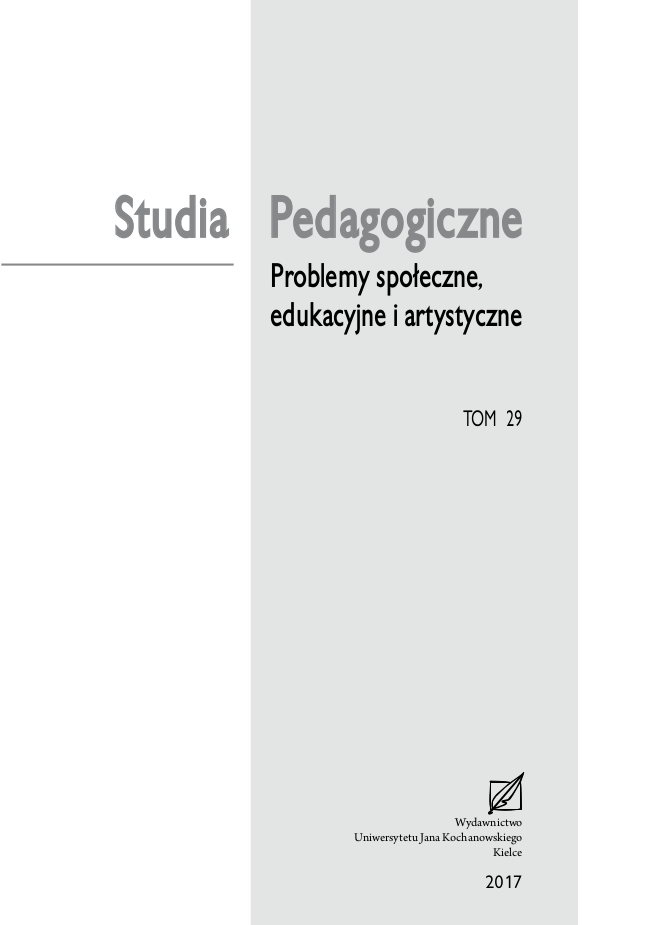
Keywords: Child amnesia; memory; personality; extraversion; openness to experience; conscientiousness; neuroticism; reconciliation; big five; first memory;
The research subject of child amnesia, in spite of many studies, leaves a lot of question marks in terms of its mechanisms and causes. Childhood amnesia covers the period when an individual evolves, acquires new skills, and develops his or her personality. Hundred and fifty students have been subjected to a questionnaire designed to measure the duration of childhood amnesia. They have also been subjected to the NEO-FFI personality questionnaire by Costa and McCrae. The relationships between the duration of amnesia in children and personality traits such as Neuroticism, Extraversion, Openness to Experience, Conscientiousness and Consciousness were sought. It has turned out that there is a relationship between the duration of childhood amnesia and Openness to experience, Neuroticism and Conscientiousness.
More...